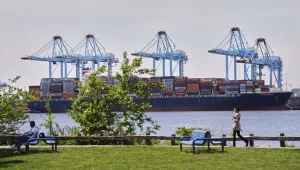Planning for the Short Haul: Trade with the Enemy During War
Speaker: Mariya Grinberg, Research Fellow, International Security Program
In times of war, why do belligerents continue to trade with each other? The speaker shows that states set product level commercial policies to balance two potentially conflicting goals — maximizing state revenue from continued trade during the war and minimizing the ability of the opponent to benefit from security externalities of the trade. States are more likely to trade with the enemy in (1) products that their opponents take a long time to convert into military capability and (2) products that are essential to the domestic economy. The amount of time it takes the opponent to convert gains from trade into military capabilities determines which products are too dangerous to be traded during a war. The mitigating factor is the amount of revenue the state can extract from trade. The more essential the product is to the domestic economy, the less a state can afford to lose trade in it.
Please join us! Coffee and tea provided. Everyone is welcome, but admittance will be on a first come–first served basis.



